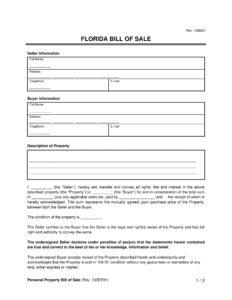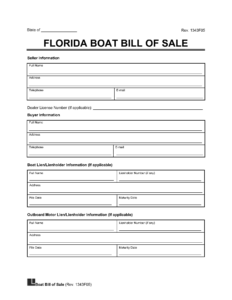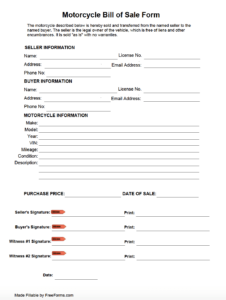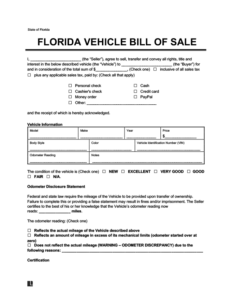Navigating the waters of vehicle or vessel ownership transfer in Florida can feel a bit complex, but there’s one document that acts as your trusty compass: the bill of sale. Whether you’re buying a used car, a boat, or even a motorcycle from a private seller, having a properly executed bill of sale is not just a good idea; it’s often a necessary step to ensure a smooth transition of ownership and fulfill state requirements. It serves as official proof of a transaction, protecting both the buyer and the seller from potential headaches down the road.
Understanding the specific requirements set forth by the Florida Department of Highway Safety and Motor Vehicles (DHSMV), commonly known as the DMV, is key to avoiding future complications. While a simple handwritten note might seem sufficient, using a dedicated form or a well-structured document ensures all the crucial details are captured accurately. This article will guide you through the importance and proper utilization of a Florida DMV bill of sale template, making your next private sale or purchase a breeze.
Understanding the Importance of a Florida Bill of Sale
A bill of sale is more than just a receipt; it’s a legally binding document that chronicles the transfer of property from one party to another. For anyone involved in selling or purchasing a motor vehicle, mobile home, or vessel in the Sunshine State, this document is fundamental. It clearly outlines the details of the transaction, providing an undeniable record of the sale date, the parties involved, and the specific item being transferred. Without it, both buyers and sellers could face significant challenges, from proving ownership to disputing future liabilities.
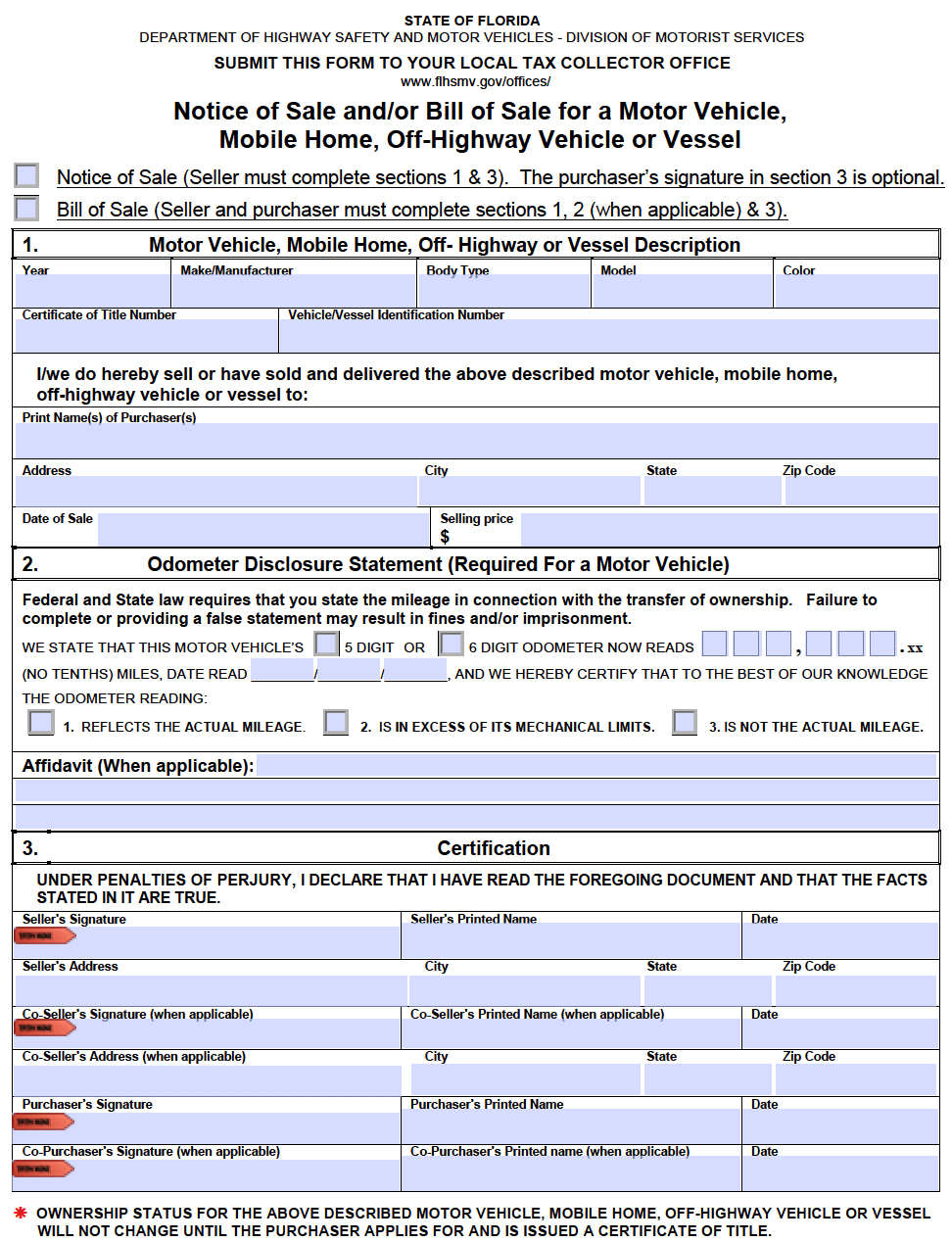
From the seller’s perspective, the bill of sale acts as a vital release of liability. Once you sell a vehicle, you want to ensure that any future issues, such as parking tickets, accidents, or even criminal activity associated with that vehicle, do not fall back on you. By properly documenting the sale and the date of transfer, you have concrete proof that the vehicle was no longer under your ownership as of that specific time. This critical piece of paper helps protect you legally and financially long after the keys have been handed over.
For the buyer, the bill of sale is equally, if not more, important. It serves as your initial proof of ownership, a crucial document you will likely need when you head to your local Florida DMV office to title and register your new purchase. Without it, the DMV may refuse to process your application, leaving you unable to legally operate your newly acquired vehicle or vessel. It provides the necessary details about the purchase price, which can be important for tax purposes, and confirms that you are the legitimate new owner.
Therefore, whether you create your own, find a general one online, or ideally, utilize a specific florida dmv bill of sale template, ensuring it includes all the necessary information is paramount. This makes sure your transaction aligns with Florida’s state requirements and avoids any unexpected snags during the titling and registration process.
Key Information to Include
* **Date of Sale:** The exact date the transaction occurred.
* **Buyer’s Information:** Full legal name, address, and contact details.
* **Seller’s Information:** Full legal name, address, and contact details.
* **Vehicle/Vessel Description:** Make, model, year, Vehicle Identification Number (VIN) for vehicles, or Hull Identification Number (HIN) for vessels, odometer reading (if applicable), and license plate number (if applicable).
* **Sale Price:** The agreed-upon amount of the transaction.
* **Signatures:** Signatures of both the buyer and the seller, along with printed names.
* **Witness Signatures:** While not always required, having witnesses can add an extra layer of validity.
How to Obtain and Utilize Your Florida DMV Bill of Sale Template
Finding the right Florida DMV bill of sale template is the first step toward a smooth transfer of ownership. The most reliable place to start your search is usually the official Florida Department of Highway Safety and Motor Vehicles (DHSMV) website. They often provide official forms or guidance on what a compliant bill of sale should include. Alternatively, many reputable legal forms websites or even county tax collector offices (which often handle DMV services) may offer downloadable templates that meet state standards. It’s always best to use a template specifically designed for Florida to ensure all local regulations are met, rather than a generic form that might miss key details.
Once you have your template, the next crucial step is filling it out accurately and completely. Take your time and ensure every field is correctly populated. This includes double-checking the spelling of names, accuracy of addresses, and most importantly, the Vehicle Identification Number (VIN) or Hull Identification Number (HIN). An incorrect digit in these unique identifiers can lead to significant delays and complications at the DMV, requiring you to get new signatures or even restart the process. Always use clear, legible handwriting or type the information if you are using a digital template.
After all the details have been carefully entered, both the buyer and the seller must sign the document. It’s highly recommended that this signing takes place in person with both parties present to avoid any future disputes about authenticity. While Florida generally does not require a bill of sale for a vehicle or vessel to be notarized for a private sale, notarization can add an extra layer of legal validity and prevent claims of forged signatures. Consider it as an optional but often recommended step, especially for higher-value transactions. Once signed, make sure to create multiple copies – one for the buyer to take to the DMV and keep for their records, and one for the seller to retain for their own documentation.
Properly using a Florida bill of sale template ultimately simplifies what could otherwise be a complicated process. It provides clear, undeniable proof of the transaction for both parties, meeting the state’s requirements for ownership transfer. By taking the time to complete it correctly, you’re not just filling out a form; you’re securing your legal position and ensuring a hassle-free experience when dealing with the Florida DMV.
Completing your bill of sale correctly is a small effort that yields significant peace of mind. It ensures that the transfer of property is clearly documented, protecting everyone involved. By understanding its importance and taking care with its preparation, you can confidently navigate the process of buying or selling a vehicle or vessel in Florida, making sure all legal bases are covered and your records are pristine. This attention to detail will undoubtedly make your experience with the Florida DMV much smoother.
